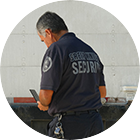When the correct interviewing, interrogation, and questioning processes are followed, a suspect’s confession can be admissible in court. Green Knight Security guards collaborate with law enforcement officers to make interview processes effective. Our goal, while offering this service, is to help discover the truth rather than obtain a confession. More information on how we interview victims, witnesses, and suspects are provided below.
What are the Legal Parameters for Interviewing Victims, Witnesses, and Suspects?
The ethical practices for interviewing victims, witnesses, and suspects have significantly changed over the past few years - courts except the facilitators to observe high standards while focusing on the accused person's right. The entire interview should aim at minimizing any mental or physical anguish that could result in a false confession. It would help if less aggressive, and less oppressive interviewing methods were used.
In meeting these legal parameters, interviewing victims, witnesses, and suspects can be a complex process. Polygraph operators and trained interrogators must be brought on board to oversee the process. Since suspects have a right to silence, getting information from them may prove difficult. The interview must know how to navigate through these challenges and deal with any false statements given by the participants.
What Should the Process of interviewing Involve?
The first stage of interaction when a crime is being investigated involves interviewing the potential suspect. At this point, you may not define the individual as a suspect if there is inadequate information linking him/her to the crime. It is possible for a suspect to report a criminal event posing as a victim or witness of the event. The individual may be regarded as a suspect when there is evidence linking him/her to a particular offense.
During the interview, the facilitator should gather the participant's version of events. The interviewer should also gather untrue statements with the hope of using them to investigate a crime. It is possible for a victim or a witness in an interview to become the main suspect. The interview only stops when real evidence is discovered, and the interviewer has a reasonable ground to suspect the individual.
Preparing for an Interview Involving Witnesses, Victims, and Suspects
All successful interviews involving witnesses, victims, and suspects in a criminal case relied on adequate preparation. Interviewers must understand and know all the aspects of the process. Keeping the interviewing sheet organized and neat helps keep the participant’s safe. The investigator should have a suitable plan to be followed once the interview is over.
In a non-accusatory interview, the investigator will be trying to get adequate information regarding a particular event. The interviewer will still interview the suspect once the suspect is identified. A non-accusatory interview can occur in person, on the telephone, or prior to an interrogation. The interview may also be carried to focus on the witness in the early investigation stages.
Interviewers need to develop a rapport with their subjects during the initial stages of the interview. While establishing rapport, they can discuss non-threatening topics meant to make the participant feel at ease. They should not ask personal questions during this process. Instead, they should verify the subject's spelling of a name, address, work history, or phone number.
Interviewing Witnesses
Investigators manage to obtain and impart information through interviews. Though witnesses fear the consequences of sharing their own account of an event, their role in an investigation is crucial. They should trust the interviewer to increase their chances of giving a full and reliable account of a criminal event. Witnesses demand to be listened to and are entitled to fair treatment.
The information provided by both victims and witnesses helps the investigator to validate or challenge a suspect’s version of a criminal event. Interviewers must conduct an initial witness assessment before the interview begins. With the assessment, it is easier for them to determine whether to classify witnesses as intimidated or vulnerable. The procedure should include witnesses’ need for specific assistance, the ability to show up in court, and the need for support.
Developing a witness interview strategy at an early stage of a criminal investigation is crucial. An interview adviser can be consulted to develop the strategy. The strategy itself should involve the following elements:
- Setting realistic and meaningful objectives, especially when dealing with significant, intimidated or vulnerable witnesses.
- Choosing competent interviewers.
- Briefing each interviewer on their specific roles for them to plan and prepare early.
- Supporting the entire interview.
- Debriefing sessions to determine whether further actions should be taken.
- Conducting supplementary interviews to clarify contradictory information or elicit additional information.
Witnesses can choose to give their statements anonymously in interviews. Anonymity, in this case, helps protect their safety and other people’s safety. It also helps prevent potential harm to the public interest and prevent severe property damage. Court s can grant witnesses who meet various legal parameters anonymity.
Interviewing Victims
Besides getting a different version of the story, interviewing victims helps identify the impacts of a particular crime. In the interview, the victims share how the criminal event affected them financially, psychologically, emotionally, and physically. Their statements usually offer investigators detailed information on the losses suffered by a victim. They can also be advised on how to join a victim support group or seek compensation following the criminal event.
Encouraging a victim to participate in an interview can help successfully prosecute violent crimes. Their statements can help the judge find a defendant guilty or not guilty. Victims of criminal events offer first-hand information about how a crime led to an individual getting injured.
An interview can help learn about a victim's lifestyle information, including finances, places frequented, leisure interests, and behaviors. Through family liaison, partners, siblings, parents, guardians, or children of a victim can take part in an investigation. A victim's family members can offer an account of a criminal event when the victim succumbs to the event, or the victim is missing. However, they must have a close and direct relationship with the victim for them to be allowed into the case.
Interviewing Suspects
Investigators tend to interview suspects in quiet, secluded locations to encourage the subjects to take time with their responses. In most cases, suspects are usually interviewed after the witnesses and victims have shared their accounts of an event. The entire interview is focused on reconstructing the details the investigator already has regarding an event. You may expect it to involve the following elements:
- The suspect recalling their emotional state and the physical state of the place at the time the incident occurred.
- Instructing the suspect to report everything regardless of how the information may seem.
- Recalling the events in different orders to determine whether the suspect is speaking the truth.
During the interview process, the investigator will cover several specific topics. The topics revolve around the interviewer describing their role in the company, explaining the part of their job and the means used to investigate an event. With this information, a guilty suspect may involuntarily react. The interviewer, on the other hand, can assess the participant’s reaction against an occurrence that is under investigation.
Find a Security Company Near Me
The success of every interview process involving witnesses, victims, or suspects depends on the subject’s cooperation and the interviewer’s skills. While acknowledging this fact, Green Knight Security is an innovative leader in the provision of reliable security services. We serve Los Angeles residents in need of security and interviewing services. Call us now at 844-457-8326 for consultation on any of our security services.







